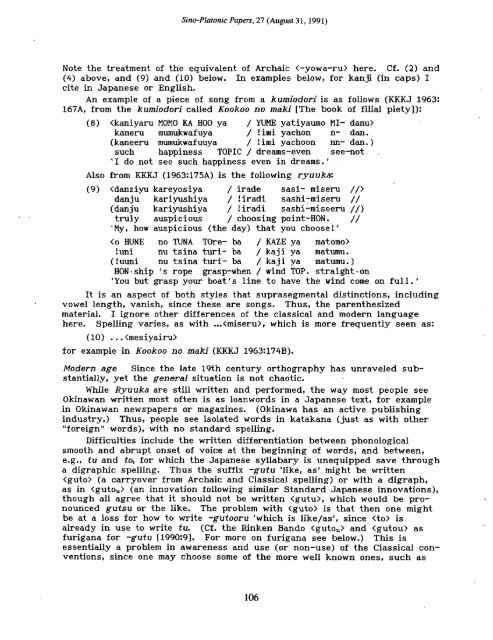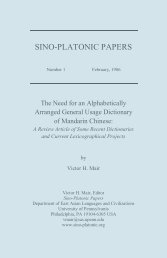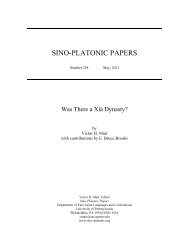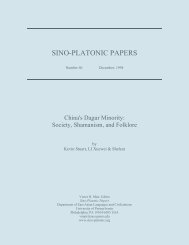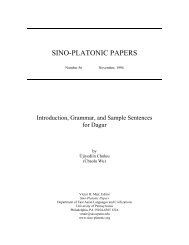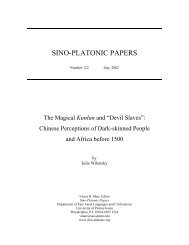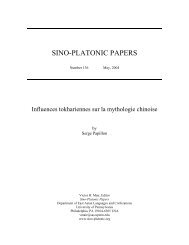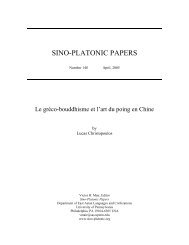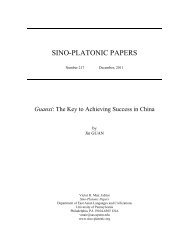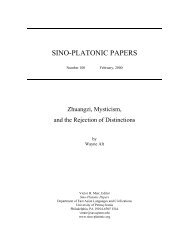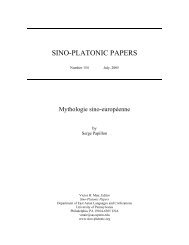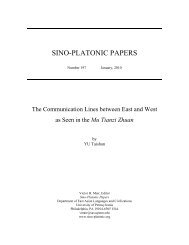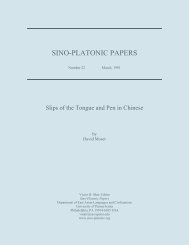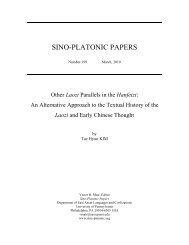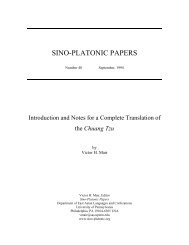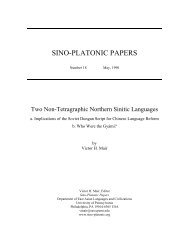Essays on Writing and Language in Honor - Sino-Platonic Papers
Essays on Writing and Language in Honor - Sino-Platonic Papers
Essays on Writing and Language in Honor - Sino-Platonic Papers
You also want an ePaper? Increase the reach of your titles
YUMPU automatically turns print PDFs into web optimized ePapers that Google loves.
S<strong>in</strong>o-Plut<strong>on</strong>ic <strong>Papers</strong>, 27 (August 3 1,199 1)<br />
Note the treatment of the equivalent of Archaic <br />
kaneru mumukwa f uya / !imi yach<strong>on</strong> n- dan.<br />
(kaneeru mumukwafuuya / !imi yacho<strong>on</strong> nn- dan.)<br />
such happ<strong>in</strong>ess TOPIC /dreams-even see-not ,<br />
'I do not see such happ<strong>in</strong>ess even <strong>in</strong> dreams.'<br />
Also from KKKJ (1963:175A) is the follow<strong>in</strong>g ryuuka:<br />
(9) (danziyu kareyosiya / irade sasi- miseru //><br />
danju kariyushiya / !iradi sashi-miseru //<br />
(danju kariyushiya / !iradi sashi-miseeru //)<br />
truly auspicious / choos<strong>in</strong>g po<strong>in</strong>t-HON. //<br />
'My, how auspicious (the day) that you choose!'<br />
<br />
!mi nu ts<strong>in</strong>a turi- ba / kaji ya matumu.<br />
(!uuni nu ts<strong>in</strong>a turi- ba / kaji ya matumu.)<br />
HONeship 's rope grasp-when / w<strong>in</strong>d TOP. straightm<strong>on</strong><br />
'You but grasp your boat's l<strong>in</strong>e to have the w<strong>in</strong>d come <strong>on</strong> full.'<br />
It is an aspect of both styles that suprasegmental dist<strong>in</strong>cti<strong>on</strong>s, <strong>in</strong>clud<strong>in</strong>g<br />
vowel length, vanish, s<strong>in</strong>ce these are s<strong>on</strong>gs. Thus, the parenthesized<br />
material. I ignore other differences of the classical <strong>and</strong> modern language<br />
here. Spell<strong>in</strong>g varies, as with ... , which is more frequently seen as:<br />
for example <strong>in</strong> Kookoo no maki (KKKJ 1963:174B).<br />
Modern age S<strong>in</strong>ce the late 19th century orthography has unraveled sub-<br />
stantially, yet the general situati<strong>on</strong> is not chaotic.<br />
While Ryuuka are still written <strong>and</strong> performed, the way most people see<br />
Ok<strong>in</strong>awan written most often is as loanwords <strong>in</strong> a Japanese text, for example<br />
<strong>in</strong> Ok<strong>in</strong>awan newspapers or magaz<strong>in</strong>es. (Ok<strong>in</strong>awa has an active publish<strong>in</strong>g<br />
<strong>in</strong>dustry.) Thus, people see isolated words <strong>in</strong> katakana (just as with other<br />
"foreign" words), with no st<strong>and</strong>ard spell<strong>in</strong>g.<br />
Difficulties <strong>in</strong>clude the written differentiati<strong>on</strong> between ph<strong>on</strong>ological<br />
smooth <strong>and</strong> abrupt <strong>on</strong>set .of voice at the beg<strong>in</strong>n<strong>in</strong>g of words, <strong>and</strong> between,<br />
e.g., tu <strong>and</strong> to, for which the Japanese syllabary is unequipped save through<br />
a digraphic spell<strong>in</strong>g. Thus the suffix -gutu 'like, as' might be written<br />
(a carryover from Archaic <strong>and</strong> Classical spell<strong>in</strong>g) or with a digraph,<br />
as <strong>in</strong> (an <strong>in</strong>novati<strong>on</strong> follow<strong>in</strong>g similar St<strong>and</strong>ard Japanese <strong>in</strong>novati<strong>on</strong>s),<br />
though all agree that it should not be written , which would be pro-<br />
nounced gutsu or the like. The problem with is that then <strong>on</strong>e might<br />
be at a loss for how to write -gutooru 'which is like/as', s<strong>in</strong>ce is<br />
already <strong>in</strong> use to write tu. (Cf. the R<strong>in</strong>ken B<strong>and</strong>o <strong>and</strong> as<br />
furigana for -gutu [1990:9]. For more <strong>on</strong> furigana see below.) This is<br />
essentially a problem <strong>in</strong> awareness <strong>and</strong> use (or n<strong>on</strong>-use) of the Classical c<strong>on</strong>-<br />
venti<strong>on</strong>s, s<strong>in</strong>ce <strong>on</strong>e may choose some of the more well known <strong>on</strong>es, such as


